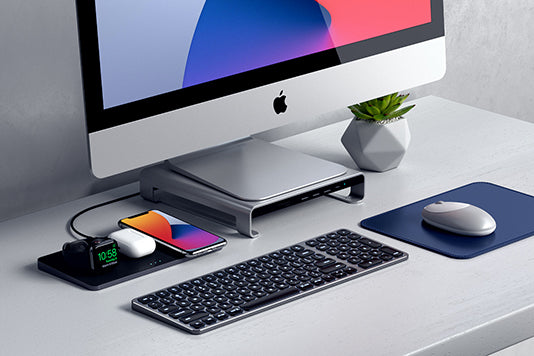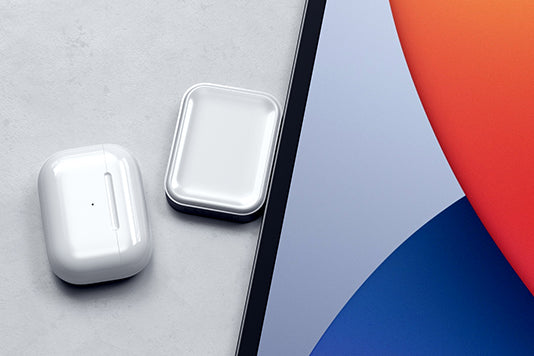USB 4.0 vs Thunderbolt 4.0: Differences and Similarities
Choosing the right thunderbolt computers and devices and USB-C cable has become very easy after the launch of Thunderbolt 4.0 technology. If you want the absolute best cable, you should buy a Thunderbolt 4.0 cable and the same is true for USB 4.0 with USB-C.
The best thing about USB 4.0 and Thunderbolt 4.0 is that both offer backward compatibility with everything. Buying cables and devices with these specifications also comes with the benefit of future-proofing.
What is Thunderbolt 4.0?
Thunderbolt is the most recent version of the Thunderbolt line by Intel. It comes with a range of benefits including backward compatibility with USB Type-C and Thunderbolt 3.0. All the cables that are Thunderbolt 4.0 certified can work with everything including USB 2.0, USB 3.1, USB 3.2, and USB 4.0.
Thunderbolt offers a data transfer speed of 40 GB/s and 100-watt PD (Power Delivery) power with fast charging. It’s important to note that Thunderbolt 3.0 also offers the same specifications. However, there are some differences, and some laptops and Windows computers used cut-down versions.
Thunderbolt 4.0 Vs Thunderbolt 3.0
All manufacturers need to make sure that they offer the top specifications of Thunderbolt 4.0 in order to be certified as Thunderbolt 4 by Intel officially. Thunderbolt 4.0 also supports any USB Type-C monitor with a resolution of up to (7,680 x 4,320) 8K. It means you can use Thunderbolt 4 USB Type-C cable which is much thinner than HDMI or DisplayPort cable to power your high-resolution displays. Additionally, unlike video cables, you can also use a Thunderbolt 4 cable to transfer data and charge devices.
Features of Thunderbolt 4
- Offers 40 GB/s bandwidth.
- Can support one 8K monitor or two 4K monitors.
- Comes with PCIe at 32 GB/s for up to 3,000 MB/s data-storage speeds.
- Offers up to 100-watt PD (Power Delivery) charging.
- Has support for docks with up to 4 ports.
- Allows you to wake your laptop or computer by moving the mouse or pressing a keyboard key if connected with a Thunderbolt 4.0 dock.
- Comes with Intel VT-d DMA (Direct Memory Access) protection that offers protection against physical DMA attacks.
What is USB 4.0?
USB 4.0 is the latest specification or version of USB that’s housed within the USB Type-C cables. It takes over from USB 3.2 and 3.0 and offers either 40 GB/s or 20 GB/s of data transfer speed. Just like Thunderbolt 4, it uses the same Type-C reversible and rounded connector.
A thunderbolt 4.0 cable can also be called a USB 4.0 cable but the opposite is not true because not all USB 4.0 cables are Thunderbolt 4.0 certified. Being the latest version, USB 4.0 is more efficient and faster than any other version of USB. It can monitor the bandwidth requirements dynamically for all the connected monitors or displays and allows you to save the remaining bandwidth at the same time for data transfer. It was not possible in any earlier version of USB as they straightforwardly split the bandwidth into two parts for data and display.
Just like Thunderbolt 4.0, USB 4.0 can also support PD up to 100-watt and it also offers backward compatibility with Thunderbolt 3.0, USB 2.0, USB 3.0, USB 3.1, and USB 3.2. A cable with USB 4.0 certification must also come with the USB logo along with the number 40 or 20 depending upon the speed (40 GB/s or 20 GB/s) it offers.
Difference Between USB 4.0 and Thunderbolt 4.0
As mentioned earlier, a Thunderbolt 4.0 cable is also a USB 4.0 cable but all USB 4.0 cables are not certified as Thunderbolt 4.0.
Both USB 4.0 and Thunderbolt 4.0 use the same USB Type-C connector which is reversible and rounded. The USB 4.0 is also based on the very same underlying protocol as Thunderbolt 4.0, and both types are tightly connected. All thunderbolt devices come with USB 4.0 support which means if you have a device with Thunderbolt 4.0 connectors you can use USB 4.0 cables.
However, not all the devices with USB 4.0 connectors will be as powerful as the ones that are fully Thunderbolt 4.0 certified. For example, Apple offers Thunderbolt 4.0 in many devices that offer the maximum bandwidth of 40 GB/s.
But many Windows computers come with USB 4.0 but offer a maximum bandwidth of 20 GB/s. Additionally, if you have a laptop with a Thunderbolt 4.0 connector, you will be able to connect two 4K displays with it. On the other hand, a device with a USB 4.0 connector will allow you to connect only one 4K display.
But the good thing about USB 4.0 is that it’s cheaper than Thunderbolt 4.0. Bear in mind that USB 4.0 devices don’t need the official Intel certification so you’ll see devices that have USB 4.0 capability but offer varying degrees of quality at the same time.
USB 4.0 vs Thunderbolt 4.0: Comparison Chart
Which Apple Products Support USB 4.0 and Thunderbolt 4.0?
If you’re not sure whether your Apple device supports USB 4.0 or Thunderbolt 4.0, the following list has got you covered. You can also use the following steps to find out the port specifications of your Apple device.
- Go to the “Apple Menu” and click on the “About This Mac” option.
- Double click on your Mac’s serial number and copy it by pressing “Command + C”
- Open the official Tech Specs page, and paste the copied serial number in the “Search Tech Specs” bar by pressing “Command + V”.
- Click on the “Search” button to see the port specification of your Mac.
Apple Devices with Thunderbolt 4.0 Support
The following Mac models come with the Thunderbolt 4.0 specification:
- MacBook Pro 16-inch - 2021 Model
- MacBook Pro 14-inch - 2021 Model
Apple Devices that Come with USB 4.0 Support
The following Apple laptops come with the USB 4.0 specification:
- Mac mini M1 - 2020 Model
- MacBook Air M1 - 2020 Model
- MacBook Pro 13-inch M1 - 2020 Model
- iMac 24-inch M1 - 2021 Model
Other Considerations
Some Apple products are also coming with the latest HDMI 2.1 specification like Apple TV and the upcoming iMac 8K. In order to utilize the full potential of these devices, you’ll need to use cables that support an 8K display. You can use Satechi HDMI 2.1 Rated 8K 60Hz Cable for this purpose.
Additionally, if you’re using an Apple laptop with thunderbolt 4.0 support, then you can use different tools to complete your laptop’s ports. For example, you can use the Satechi Thunderbolt 4.0 dock that offers a vast range of different ports including:
- DC input port 20V
- Thunderbolt 4 host port - PD 96W
- 3 x Thunderbolt 4 ports - 40 Gbps, 15W
- Gigabit Ethernet
- 3 x USB-A 3.2 data ports - up to 10 Gbps
- USB-A 2.0 charging
- UHS-II SD card reader
- 3.5 mm audio jack port


Leave a Comment
Irresistible! Thank you a lot for this type and precise carrier.your offerings is higher than higher.
Good